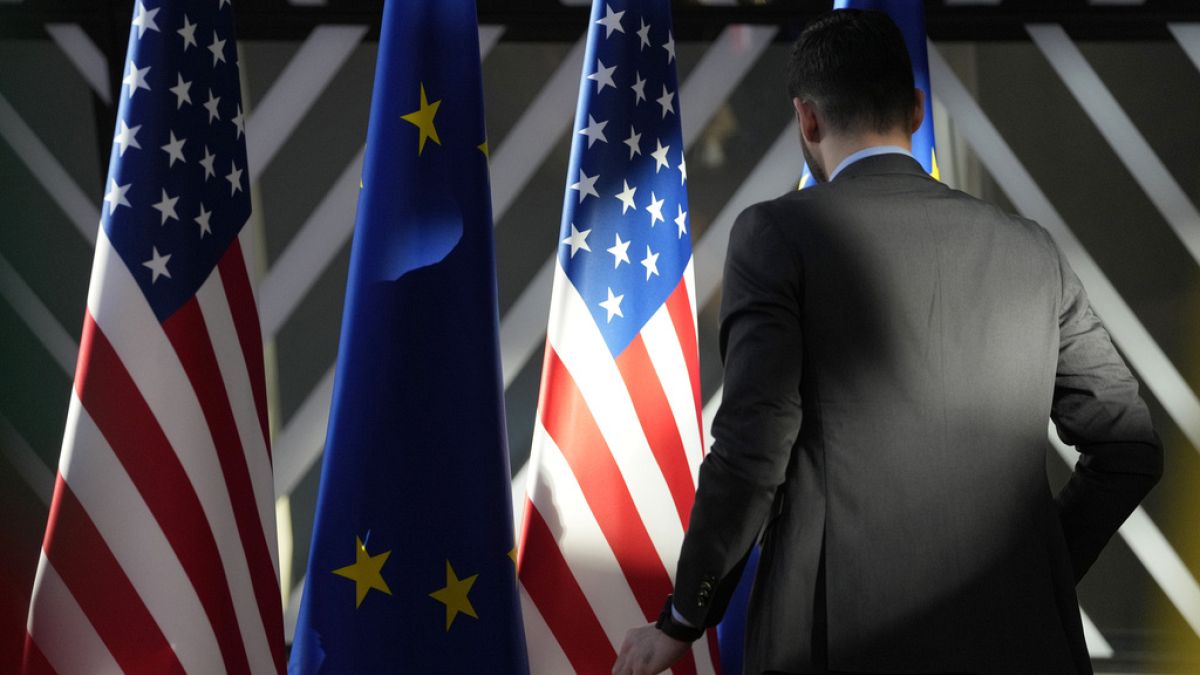How to counter Trump’s trade war?

President Trump has hit Canada, China and Mexico with threatened tariffs in the last week. The EU is waiting its turn and mulling its potential response.
Anti-coercion, antitrust, and targeted tariffs are among deployments that the EU could unleash in a response to a keenly anticipated tranche of tariffs from the Trump White House, but defence budgets might also come into play, experts Euronews spoke to have suggested.
Having hit Mexico, Canada and China, the EU now appears in Donald Trump’s sights with the bloc and its trade surplus described as “an atrocity” by the US president last week.
While repeating that trade between the US and the EU benefits both blocs, with a goods surplus of 155.8 billion for Europeans and a services surplus of 104 billion for Americans, the EU is sharpening its strategy and reviewing its trade weapons.
Faced with targeted tariffs, the answer may well be targeted tariffs. “Very specific customs duties could be applied to everyday consumer goods such as Harley Davidsons and jeans like the EU did in 2018,” Elvire Fabry, expert at the Delors Institute, said. “We would not target pharmaceutical products or components that can’t be obtained elsewhere.”
In 2018, during his first term in office, Donald Trump already led the charge against Europeans with tariffs on European steel (25%) and aluminium (10%). The EU retaliated by taxing Bourbon whiskey, Harley-Davidsons and a range of other products. Tariffs were abolished under the Biden administration, but only until March this year.
March will be decisive for the EU-US trade talks. Not only is the truce over the steel and aluminium trade dispute coming to an end, but by 25 March the Commission must decide whether Alphabet (which owns Google), Apple and Meta comply with the Digital Markets Act (DMA), the landmark digital regulation which is the bête noire of the tech giants which seem now fully to have lent support to the Republican president.
Anti-coercion instrument on the cards?
“Over and above the trade deficit issues, there is Trump’s annoyance with European regulations. His attack may be more structural. We would then be entering the realm of economic coercion,” Elvire Fabry said.
Since 2023, the Europeans have an anti-coercion arsenal to protect the EU from duress from third countries. If dialogue with the Trump administration fails, the regulation includes restrictions on the right to participate in public procurement tender procedure, restriction on licence, or for instance restrictions on trade in services and trade-related aspects of intellectual property rights. The Financial Times has reported that the Commission is indeed readying this as a response, citing officials with knowledge of the plans, who have pointed to the ACI as the toughest response available without breaching international law.
“We would be well advised to aim for US digital dependence on the European market,” Fabry assessed, adding: “The EU could target the granting of licences in the digital services sector. Access to data is essential for the Americans. This is black gold.”
Aiming for intellectual property rights would up the ante in any trade dispute, but not all commentators agree this would work. “This is a nuclear option compared to tariffs being sort of a conventional war option,” Fredrik Erixon, director of the European Centre for International Political Economy (ECIPE) said, adding: “That instrument has to be proportionate to the actions that you’re retaliating against, because if you invalidate, for instance, a patent or a trademark, that is the same thing as you are pulling away property rights.”
On top of that, the expert explained that IP rights are not traditionally part of the EU competence and are governed by international rulebooks. “Member states have obligations under the European Patent Convention that goes beyond what the EU can do.”
Whatever weapons Donald Trump brandishes, the fate of US Big Tech could hang in the balance. Could antitrust then become a commercial weapon? China has opened an antitrust investigations against Google after the US imposed 10% tariffs on its imports. The European Commission claims antitrust will not be used in a trade war with the US, however.
“When it comes to enforcement of EU antitrust competition law, it is agnostic to the country of establishment of the company involved,” Commission spokesperson Lea Zuber claimed on Tuesday, “We don’t think that competition enforcement should become a tool in trade disputes.”
Those competition investigations are however more likely to trigger reaction from the US than reactivation of the steel and aluminium retaliatory tariffs, according to Erixon. He said that EU antitrust investigations on Big Tech are already part of EU- US trade diplomacy nexus. “The Biden administration was already frustrated with what they perceived as digital protectionism in Europe and started to draw up a couple of trade sanctions against European actions,” he said.
With Europe planning expansion of military spending, arms could also come into play in any trade dispute. “There is a lot of more trade going on here now,” Erixon foreseen. “NATO countries point towards a 3% spending target, which would be strongly in the US interest.” Leaning towards defence procurement as open as possible to collaboration with American suppliers “would be a powerful tool in their hand”, according to Erixon.
He also thinks that lowering automotive tariffs to zero could soften up the Americans. The EU already has such deals with Japan, South Korea and Turkey. “ This option is not going to lead to much more automotive exports from America to Europe. But still you are handing Americans an opportunity for more market access,” he said.
No trading on end of liberal democracy
Whatever happens, a potential trade war will once again test the unity of Europeans. But they would need to react rapidly to Donald Trump’s actions. Will the 27 Member States be able to get their act together quickly? Not everyone is sure.
“Not every countries are going to be offered the same deal, it will be very difficult to maintain the unity,” according to Fabian Zuleeg, chief executive and chief economist at the European Policy Centre said, adding: “Those that Trump sees as being friendlier to the US will be offered a way out.” The expert predicts that countries like Hungary, which the US president sees as like-minded, could be promised investments and better economic relations.
Moreover, the deals struck by Canada and Mexico in the days following the announcement of the US trade sanctions show that it’s not all about trade. Mexicans and Canadians have reached agreements on migration and border controls.
“We now have the range of different trade defence instruments which will be used. But the situation might require a much wider political response of the Europeans which also addresses all the other issues which are on the table, including, for example, Greenland,” Zuleeg said.
For Europeans, the security stakes are also in the balance. “The argument will be too around European security, about Ukraine, about all the other issues the Europe is scared about,” the expert added.
If negotiations are down to the bottom line, however, Zuleeg’s assessment appears bleak.
“I think that what Trump wants is the destruction of the EU and the end of liberal democracy. But now these are not concessions we can give,” he said.
World News || Latest News || U.S. News
Source link



